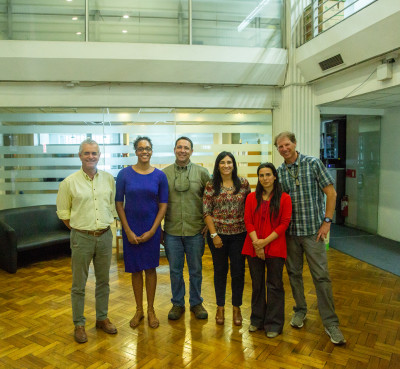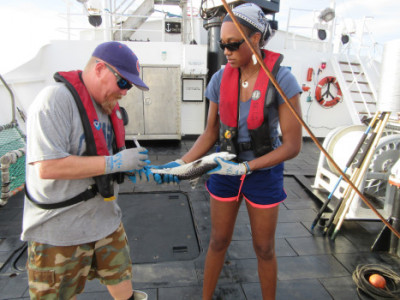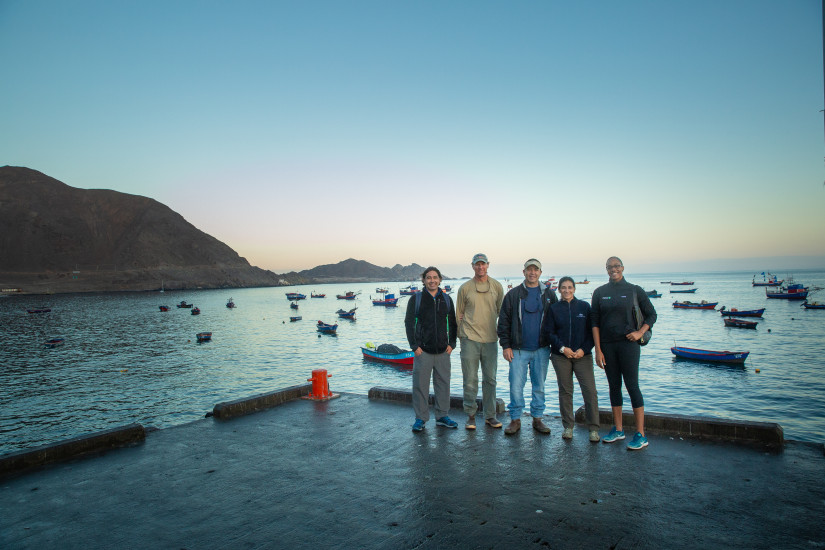Jet-setters of the high seas, swordfish roam thousands of miles across the open ocean. They may cross dozens of international boundaries, of which they remain entirely unaware. Yet, in order to manage sustainable fisheries for swordfish and other highly migratory species, all of the countries involved must come together in significant coordinated efforts.
“I think what's cool about working on those groups of species is that they aren't staying in coastal waters,” says Alexis Jackson, who launched her career in fisheries management as a Sea Grant Knauss Fellow. “They hang out in the US sometimes and then they're in areas beyond national jurisdiction. And so there's both a domestic and an international component, and the way that those two interplay is just really fascinating.”

A fisheries project director with the California Chapter of The Nature Conservancy—one of the largest environmental non-profits around the world—Jackson helps inform management plans and policies for some of these highly migratory species, such as swordfish off of California. But she wasn’t always engaged in the world of domestic and international fisheries policy.
Before jumping into resource management, Jackson completed her PhD at UC Santa Cruz, where she had focused on scientific aspects of small-scale fisheries. She then decided to take on a year-long Knauss fellowship. “I originally thought, ‘Okay, I'll do this fellowship. I'll learn a little bit about how policy and fisheries management are relevant to research, and then I'll go back to academia,’” she says.
The John A. Knauss Marine Policy Fellowship provides graduate students with a chance to work in executive or legislative offices where they get hands-on experience in national resource management related to oceans, coasts, and the Great Lakes. Candidates go through a matching process, where they get to meet and interview with representatives from the different offices, and rank their choices for placement.
“It basically changed the trajectory of my career,” says Jackson.
Jackson matched with the Highly Migratory Species (HMS) management division at the National Marine Fisheries Service (NOAA Fisheries). Her first choice. “I was stoked to get placed with them,” she says.
As a fellow, Jackson got to be a part of the action. She explains that she was actively included in decision making and felt like a real member of the team. “As a fellow, I was deep in the data analysis, got to help with [regulation and Fishery Management Plan] drafting, and was going to some of these meetings where we were presenting to the councils and gathering input,” she says. “It's like I had an equal vote on the team, and that was awesome.”

In fact, what could be one of the most alluring parts of the fellowship also proved to be one of the bigger challenges: balancing “the millions of opportunities that come up as a fellow.” Jackson managed this by choosing the experiences which would be most directly related to her fellowship position. A two week research cruise to learn what onboard observers faced and see the gear and operations at-sea. The one conference at which she would most like to present. All things considered, she says, “It’s not a terrible problem to have.”
After her fellowship ended, Jackson stayed on with the NOAA HMS division as a contractor for close to a year. She had become invested in two of the fisheries management plans she was working on, and wanted to see it through until certain amendments had been made into final rules. No longer just an academic, she now embraced the field of fisheries management. She continued to work with highly migratory fish at the Pew Charitable Trusts before landing at The Nature Conservancy. And Jackson feels like her time in the fellowship has driven the course of her career path.
“They are a direct line. The people that I met at Pew, I met during my fellowship year,” she says. “It's just a small network of people. So each [position I’ve taken] has led to the next, and it started with my fellowship, to be honest.”
And it’s a field that she expects to continue working in, for the foreseeable future. Just like the swordfish crossing international boundaries, Jackson's career path had brought her from science to the challenging and engaging world of international fisheries policy. Climate change throws a new wrench into fisheries management, generating new and evolving problems in the ongoing battle for sustainable fisheries. There will be a need for people experienced in this process for many years to come.
“They haven't solved all of the problems,” says Jackson. “There's still work to be done.”

About California Sea Grant
NOAA’s California Sea Grant College Program funds marine research, education and outreach throughout California. Headquartered at Scripps Institution of Oceanography at the University of California San Diego, California Sea Grant is one of 34 Sea Grant programs in the National Oceanic and Atmospheric Administration (NOAA), U.S. Department of Commerce.